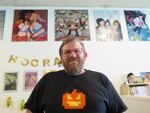Comic books are one of the last mass-produced forms of serialized fiction on the page.
You can go to a comic book shop and pick up monthly editions of Batman, Star Wars and hundreds of other titles. Increasingly, readers are also finding them on the shelves of local bookstores.
If you’re in Portland’s most famous bookstore, Powell’s City of Books, head for the Gold Room if you want a cup of strong coffee — and lots of comics.
Doug Chase is the buyer who decides which comics get on shelves. Powell’s book-format comics offerings have multiplied over the years.
“It’s grown from one bank of books to a big part of the Gold and Coffee Room," Chase said. "And I think more expansion is on the way.”

Doug Chase says book-format comics are on the rise in retailers like Powell's City of Books in downtown Portland.
Nick Hennessy / OPB
Powell’s doesn’t stock single issues. What bookstore readers are looking for, Chase said, is a long-form immersive read.
“(Graphic novels are) very accessible storytelling, and you can tell all kinds of different stories,” he said.
Powell’s success selling book-format comics is not an isolated phenomenon.
Calvin Reid, a senior news editor at Publishers' Weekly, and co-editor of PW Comics World, has followed the blossoming graphic novel market for years. He said book publishing business and book publishing practices are having a tremendous impact on the comics business.
For nearly 100 years, Reid explained, periodical comics like Superman and Thor have been made on a work-for-hire basis.
“Generally,” Reid said, “the authors, the writers, artists are paid by a page rate that can vary based on your status in the business. You’re being hired to work on properties owned by the publisher.”
With the exception of a few top-tier creators, Reid said, “it’s not a royalty deal. You’re not going to get money down the road.”
In book publishing, authors get an advance upfront, plus royalties once the publisher’s made its money back.Analysts believe book formats like graphic novels are on pace to surpass periodical sales in 2019. The longer and more involved comics stories become, the more creators are asking for — and getting — these book-style deals.
With different kinds of long-form narratives in play, the comics industry is going through a shift not unlike science fiction’s transition from monthly magazine stories to novels. And, as Reid points out, a much greater variety of stories with diverse characters by a wider range of creators are now finding their way to the shelves.
“Serialization is not the problem. It’s more the over reliance on a single genre to the exclusion of everything else.
Analysts believe book formats like graphic novels are on pace to surpass sales of serial style comics in 2019. Almost everything that gets printed has to pencil out in book form.
This may mean more for imprints heavily invested in caped crusaders; most of Oregon’s publishers are insulated — or adapting.
Image Comics in Portland and Milwaukie-based Dark Horse have specialized in book format comics for years. This month, Portland-based Oni Press — which publishes Scott Pilgrim and other boutique favorites — became the latest comics imprint to sign an agreement with a book distributor, Simon and Schuster. It's another way to get the company's titles in front of more bookstore customers, and insulate it from instability in the comic book direct market.
James Lucas Jones, Oni’s publisher, said the distribution deal made sense because of "the growth of the book segment as it got closer and closer to parity with the comic shop market.”
Oni doesn’t do much with superhero-themed periodicals, so thinking about upfront investments has always been part of its business plan. For all the company’s strong history as a book format publisher, Jones said Oni will never abandon comic book stores.
“It’s definitely been a rough year in the periodical market,” Jones said. “If you look at it from the book side, a lot of book publishers would be salivating to still have 1,000 or 1,500 direct market brick-and-mortar stores around.”

James Lucas Jones, the publisher of Oni Press, says the no. 1 way readers find their book format comics is through libraries, with comic books and book stores close behind.
April Baer / OPB
There are several ways comics publishers mitigate upfront risk. One way is to wait and see what’s selling.
Dark Horse keeps a close eye on small presses’ digital and bound offerings, repackaging some of them for a larger audience. Licensed series, like Cartoon Network’s “Rick and Morty” (Oni) bring in revenue that lets publishers take risks on original stories.
At the retail level, many Portland comic book stores already reflecting the industry’s future.
At Northeast Portland’s Cosmic Monkey Comics, Jen Lundstrom brought her elementary-age daughter, Taylor, in to grab the latest Archie comic.
“Her collection of Archie is BIG. Like, a big shelf full,” Lundstrom said.
Taylor is part of the wave of middle-grade readers who make up the growth in the comics industry. The day they visited the store, a Wednesday, is the industry’s day to release new periodical issues. There were plenty of older, male customers stopping in to grab fresh issues of X-Men, Batman and Hellboy.
But Cosmic Monkey’s floor plan is the shape of things to come, with expanded sections for kids titles, graphic novels, science books and other narratives. Most periodicals are at the back of the store.
The floor plan was less a recent development than a reflection of the owners’ interests when they opened the store. But co-founder Adam Healy said it’s clear the global audience for book-format titles simply dwarfs the traditional periodical market.
“The comics market for the last 20-30 years has been really small — 300,000 maybe; 500,000 would be really generous," he said.
Meanwhile, Healy pointed out global sales for non-periodical comics have already surpassed $1 billion.
